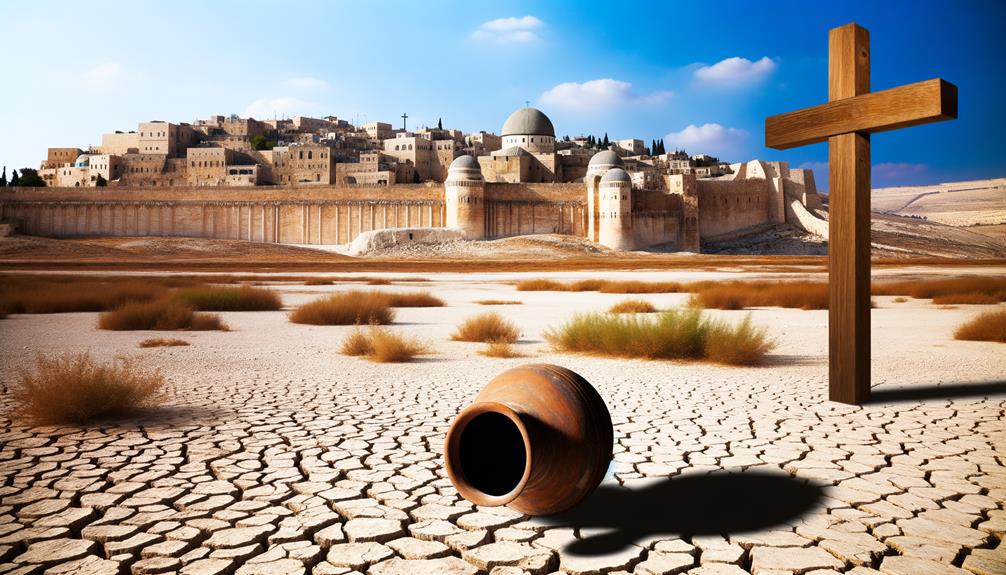I Am Thirsty Bible Verse Meaning: Spiritual Fulfillment
The phrase ‘I am thirsty‘ in John 19:28 emphasizes Jesus’ humanity and the fulfillment of Old Covenant prophecy, particularly Psalm 69:21. It reveals his intense physical suffering during the crucifixion while symbolizing a deeper spiritual longing for reconciliation with humanity.
This duality underscores Jesus’ role as both fully divine and fully human, demonstrating his empathy and solidarity with human frailty. The statement also serves as a profound theological assertion of Jesus’ mission to redeem and restore spiritual fulfillment.
Understanding this verse offers richer insights into the intertwining of physical and spiritual dimensions in Christian theology.

The Meaning of I Am Thirsty in the Bible: Spiritual Symbolism and Prophecy
| Aspect | Details |
|---|---|
| Bible Verse Reference | John 19:28, “I am thirsty.” |
| Context | Spoken by Jesus during His crucifixion, reflecting His physical suffering and anguish. |
| Literal Meaning | Jesus expressing physical thirst after enduring immense suffering. |
| Spiritual Symbolism | Highlights Jesus’ humanity and His willingness to endure pain for humanity’s salvation. |
| Prophetic Fulfillment | Connects to Psalms 69:21, “They gave me vinegar for my thirst,” fulfilling scripture. |
| Deeper Message | Demonstrates Jesus’ obedience to God’s plan, even in suffering, and His role as Messiah. |
| Application for Believers | Encourages reflection on Christ’s sacrifice and the fulfillment of God’s promises. |
The Significance of ‘I Am Thirsty’

Analyzing the phrase ‘I am thirsty‘ within its biblical context reveals profound theological and symbolic layers that contribute to our understanding of Christ’s humanity and divine mission.
This utterance, found in John 19:28, serves as a poignant reminder of Jesus’ genuine human experiences, emphasizing His physical suffering on the cross.
Theologically, it signifies the fulfillment of Scripture, particularly Psalm 69:21, linking Old Covenant prophecies with New Covenant events.
Symbolically, the expression of thirst can be interpreted as Christ’s profound spiritual longing for the reconciliation of humanity with God.
This duality—His physical need and spiritual yearning—underscores the incarnational reality of Jesus, who fully participates in human suffering while simultaneously enacting divine redemption.
Historical Context of the Verse

Understanding the historical context of the phrase ‘I am thirsty’ provides deeper insight into its significance, situating Jesus’ utterance within the socio-cultural, religious, and political milieu of first-century Judea. The phrase, found in John 19:28, occurs during the crucifixion, a form of Roman execution designed to maximize suffering and public humiliation. Jesus’ declaration of thirst not only highlights his physical suffering but also resonates deeply within the cultural and religious practices of the time.
| Aspect | Contextual Insight |
|---|---|
| Socio-Cultural | Public crucifixion as a common punitive measure |
| Religious | Passover and sacrificial associations |
| Political | Roman occupation and control over Judean territories |
| Linguistic | Use of Aramaic and Hebrew in daily and religious life |
This environment profoundly shapes the interpretation of Jesus’ words.
Fulfillment of Old Testament Prophecy

The fulfillment of Old Covenant prophecy through the life and ministry of Jesus Christ is a significant theological cornerstone, warranting careful examination of prophetic Scripture references.
By analyzing these ancient texts, one can discern the profound implications of Jesus’ words and actions as they align with messianic expectations.
This exegetical inquiry not only affirms the continuity of biblical narrative but also elucidates the divine orchestration manifest in the New Covenant.
Prophetic Scripture References
In examining prophetic scripture references, it is essential to recognize how Old Covenant prophecies find their fulfillment within the New Covenant narrative, thereby reinforcing the continuity and divine orchestration present within the biblical canon.
The statement ‘I am thirsty‘ (John 19:28) is a prime example, directly correlating to Psalm 69:21, ‘They gave me vinegar for my thirst.’ This alignment underscores the meticulous fulfillment of messianic prophecies, portraying Jesus as the anticipated Messiah.
Such prophetic fulfillments not only authenticate the New Covenant accounts but also highlight the intricate, divinely inspired interweaving of the scriptures.
The coherence between these scriptures reveals a profound theological depth, affirming the reliability and divine nature of biblical revelation.
Jesus’ Words Significance
Examining the significance of Jesus’ words in relation to Old Scriptures prophecy reveals the deliberate and calculated fulfillment of messianic predictions, emphasizing the theological continuity within the biblical narrative.
Jesus’ declaration, ‘I am thirsty‘ (John 19:28), is a direct allusion to Psalm 69:21, which states, ‘They gave me vinegar for my thirst.’
This utterance not only underscores Jesus’ awareness and intentional enactment of prophetic Scripture but also affirms His messianic identity.
The fulfillment of this prophecy serves to bridge the Old and New Covenants, reinforcing the belief that Jesus is the anticipated Messiah.
Such a precise correlation between Jesus’ words and scriptural prophecy enriches the understanding of divine orchestration in redemptive history.
Jesus’ Human Experience
Understanding Jesus’ human experience necessitates an exploration of the Gospels, which meticulously document His interactions, emotions, and physical sufferings. The verse ‘I am thirsty’ (John 19:28) poignantly underscores Jesus’ humanity. This declaration, uttered during His crucifixion, reveals His susceptibility to physical pain and need, characteristics shared with all humans.
| Aspect | Gospel Reference | Description |
|---|---|---|
| Interaction | John 4:7-26 | Jesus speaks with the Samaritan woman |
| Emotion | John 11:35 | Jesus weeps at Lazarus’ tomb |
| Physical Suffering | Matthew 27:32-56 | Jesus’ crucifixion details |
These instances collectively illustrate Jesus’ genuine human experience, affirming His capacity to empathize with human frailty and suffering. Such insights are critical for a thorough theological understanding.
Spiritual Thirst and Satisfaction

The concept of spiritual thirst and satisfaction is vividly depicted in biblical texts, addressing humanity’s intrinsic yearning for divine fulfillment.
Scriptural references to ‘living water‘ symbolize the quenching of the soul’s profound longing through a relationship with the divine.
This theological motif underscores the promise of eternal satisfaction found in communion with God, offering a perpetual source of spiritual sustenance.
Seeking Divine Fulfillment
In exploring the concept of divine fulfillment, one finds that spiritual thirst and satisfaction are recurrent themes throughout biblical scripture, symbolizing the deep human longing for a profound connection with the divine.
This yearning is poignantly captured in Psalm 42:1-2, where the psalmist likens the soul’s thirst for God to a deer panting for water. The metaphor underscores an intrinsic desire for something greater than worldly pleasures—an eternal, divine relationship.
John 4:14 further elucidates this, with Jesus offering ‘living water‘ to the Samaritan woman, signifying the eternal satisfaction found in Him.
Therefore, the biblical narrative consistently portrays spiritual thirst as a catalyst driving believers towards seeking divine fulfillment and engaging in a transformative relationship with God.
Quenching Soul’s Longing
Addressing the soul’s longing for spiritual fulfillment necessitates a profound comprehension of biblical teachings on divine sustenance and satisfaction.
The phrase ‘I am thirsty,’ uttered by Jesus on the cross (John 19:28), symbolically underscores humanity’s deep spiritual thirst. Exegetically, this statement reflects the fulfillment of Messianic prophecies and emphasizes the intrinsic need for divine connection.
The Bible frequently employs thirst as a metaphor for spiritual longing, elucidating that true satisfaction stems from a relationship with God. Psalm 42:1 likens the soul’s yearning to a deer panting for water, illustrating the depth of spiritual desire.
Consequently, the Scriptures provide a framework for understanding how divine sustenance addresses and ultimately quenches the profound spiritual thirst inherent in human existence.
Eternal Living Water
Understanding spiritual fulfillment through divine sustenance naturally leads to examining the concept of ‘Eternal Living Water‘ as articulated by Jesus in John 4:14, where He promises that whoever drinks the water He provides will never thirst again.
This metaphorical ‘Living Water’ signifies the perpetual satisfaction of spiritual needs through a sustained relationship with Christ. The Johannine text emphasizes the transformative nature of this divine provision, contrasting temporal physical thirst with eternal spiritual fulfillment.
The ‘Living Water’ symbolizes the Holy Spirit, indwelling believers and providing continuous spiritual nourishment. Therefore, it points to the eschatological reality where spiritual thirst is permanently quenched, offering a profound understanding of salvation and eternal life.
Consequently, Jesus’ promise underscores the inexhaustible and transformative power of divine grace.
Empathy in Jesus’ Suffering
Through a careful examination of the Gospels, one can discern how Jesus’ suffering not only underscores His profound empathy for humanity but also serves as a divine model for enduring and alleviating human pain.
His cry of ‘I am thirsty’ (John 19:28) profoundly illustrates His identification with human vulnerability and physical suffering. This moment invites reflection on the depth of His compassion and solidarity with human frailty.
Consider the following aspects:
- Physical Manifestation: Jesus’ thirst underscores His genuine human experience.
- Symbolic Resonance: Highlights the fulfillment of Scripture.
- Emotional Connection: Demonstrates His ability to empathize with human suffering.
- Divine Solidarity: Reinforces His role as the Suffering Servant.
Theological Implications for Believers

Examining the theological implications of Jesus’ suffering for believers reveals how His empathy and pain provide a foundational framework for Christian identity and praxis.
This moment of profound vulnerability underscores the incarnational theology central to Christian belief, emphasizing that Christ shares in human suffering.
The declaration ‘I am thirsty’ (John 19:28) serves as a poignant reminder of Jesus’ full humanity and His solidarity with the afflicted.
This identification with human pain bolsters the doctrine of theosis, where believers are called to partake in divine nature through Christ’s example.
Therefore, this verse urges believers to embody compassion, recognizing their shared participation in both the suffering and redemptive mission of Jesus, thereby shaping a life of sacrificial love and service.
Practical Lessons for Today

In contemporary contexts, the verse ‘I am thirsty’ (John 19:28) offers profound insights into the necessity of recognizing and addressing both physical and spiritual needs within our communities. This statement from Jesus underscores the importance of empathy and active response to human suffering.
By reflecting on this verse, several practical lessons emerge:
- Empathy in Action: Recognize and respond to the needs of others, both physical and spiritual.
- Community Support: Foster a culture of mutual aid and compassion within communities.
- Holistic Care: Address both bodily necessities and spiritual well-being simultaneously.
- Mindful Awareness: Be vigilant of the subtle cues indicating distress or need around us.
These lessons encourage a thorough approach to human compassion.
Conclusion
The utterance ‘I am thirsty‘ by Jesus, as recorded in John 19:28, encapsulates profound theological significance. It highlights the fulfillment of Old scripture prophecy, underscores Jesus’ genuine human experience, and symbolizes the spiritual thirst that only divine satisfaction can quench.
Much like a parched traveler finding an oasis in a desert, believers are drawn to the living water offered through Christ’s sacrifice, a demonstration of empathy and ultimate redemption.
This verse remains a cornerstone for understanding Jesus’ dual nature and mission.






